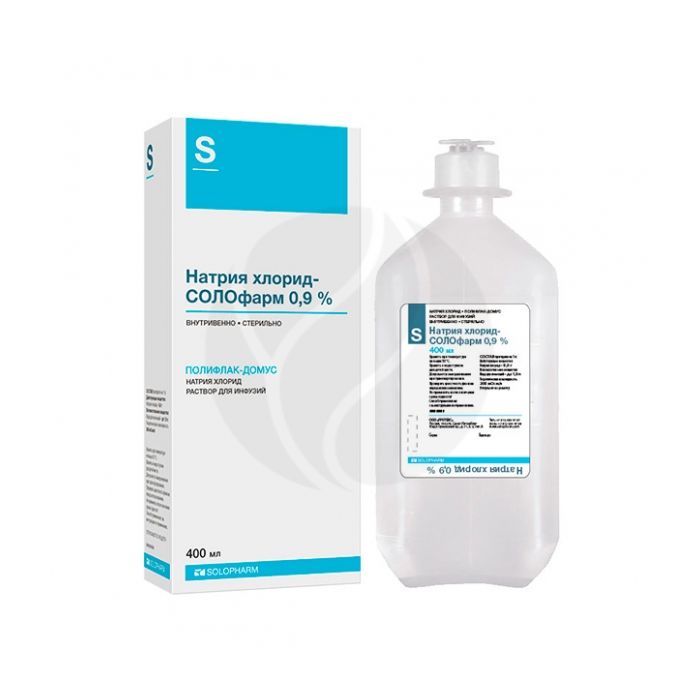Sodium chloride solution 0.9%, 400ml
Expiration Date: 05/2027
Russian Pharmacy name:
Натрия хлорид раствор 0.9%, 400мл
Isotonic solution: dehydration of various origins. To maintain blood plasma volume during and after surgery. As a solvent for various preparations.
Hypertonic solution: disorders of water-electrolyte metabolism: deficiency of sodium and chlorine ions; hypoosmolar dehydration of various origins (due to prolonged vomiting, diarrhea, burns; with gastric fistula, pulmonary bleeding, intestinal bleeding).
Isotonic sodium chloride solution is administered intravenously, subcutaneously and in enemas, and is also used for washing wounds, eyes, and nasal mucosa. It is more often administered intravenously, depending on the clinical situation - up to 3 l / day.
Hypertonic sodium chloride solution is administered intravenously. A single dose for intravenous jet injection can be 10-30 ml. In conditions requiring immediate replenishment of sodium and chlorine ions, the drug is injected intravenously at a dose of 100 ml.
sodium chloride
Hypernatremia
state of overhydration,
the threat of pulmonary edema, brain.
pharmachologic effect
Sodium and chlorine ions are the most important inorganic components of the extracellular fluid, maintaining the appropriate osmotic pressure of blood plasma and extracellular fluid. An isotonic solution replenishes the lack of fluid in the body during dehydration. Hypertonic sodium chloride solution with intravenous administration provides a correction of the osmotic pressure of the extracellular fluid and blood plasma. When applied topically in ophthalmology, sodium chloride has a decongestant effect.
Side effect
Possibly: nausea, vomiting, diarrhea, stomach cramps, thirst, lacrimation, sweating, fever, tachycardia, arterial hypertension, impaired renal function, edema, shortness of breath, headache, dizziness, anxiety, weakness, twitching and muscle hypertonicity.
Application for impaired renal function
Large volumes of sodium chloride are used with caution in patients with impaired renal excretory function.
special instructions
Large volumes of sodium chloride are used with caution in patients with impaired renal excretory function, with hypokalemia. The introduction of large amounts of the solution can lead to chloride acidosis, overhydration, increased excretion of potassium from the body. The hypertonic solution is not used s / c and i / m. With prolonged use, it is necessary to control the concentration of electrolytes in the plasma and daily diuresis. The temperature of the infusion solution should be 38 ?

